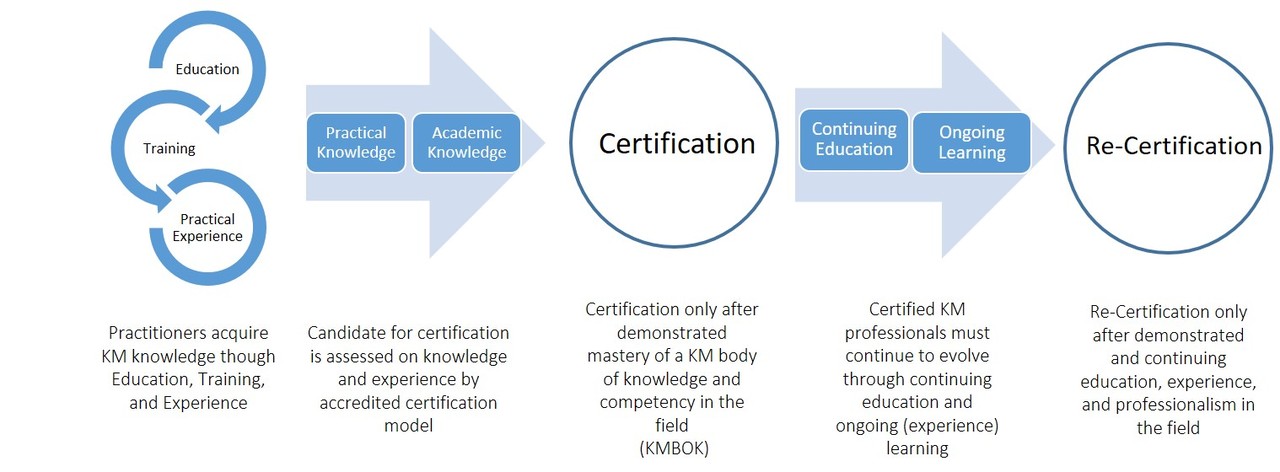
(Part II) Practically Speaking, Does Professional Certification in Knowledge Management Exist...How Will You Know It's Real??
There are pockets of effort around the world to begin to develop a Knowledge Management Body of Knowledge (KMBOK) but it doesn’t yet exist. The closest we have to real codification may be the 2015 version of ISO 9001 which has clause, 7.1.6, on organizational knowledge and its management.
You know from reading Part I of this discussion that real, meaningful certification involves a whole lot more than “training” and that “KM certification” as it is being sold and promoted today is a misnomer.
So how will you know KM certification when you see it? I suggest that it will involve the following process and content.
Would appreciate your thoughts on this? Make sense? What more is needed?

Human-Focused Senior Consultant Uncovering Key Insights to Guide Strategy for Critical Infrastructure Clients
1yBill Kaplan have you seen any significant progress toward a KMBOK as of late?
teacher, poètes engagé; Writer; Apprentice Griot; Perpetual Abecedarian; ol' Bell Head; Engineer; Hacker; window thru which The "I Am" Shines; Poet; #WokeAF; Ham Radio Operator; Blerd; Alpha Phi Alpha (ΑΦΑ); #BlackinSTEM
5yI agree with your assessment in parts I and II. (Thanks for saving me $!) It strikes me that most of the certification programs are more about marketing the certifiers and than about providing value for the students, and it's concerning that employers are asking for these "cerifications" without a clear understanding of them. The closest thing to "standard" certification of knowledge management is part of ITIL certification--although narrowly focused on Service management. ITIL is a well known framework and it should be possible to include the ITIL definition of KM in a "standard" KMBOK and KM certification. (Here's a great description of ITIL KM from BMC's website: http://www.bmc.com/guides/itil-knowledge-management.html BTW I'm not affiliated with BMC) As well, I'd like to see standards bodies at IEEE (full disclosure, I'm a Senior Member) or ISO pick up the development of the KMBOK.
Product leader: Enterprise smart software
7yI think your definition of certification is too narrow. It is after all, just one possibility. We certify attorneys to represent people with no experience. In fact, many more serious professional credentials that "certify" are based only on assessed knowledge. An argument could also be made that certifications such as PMP that require experience are too restrictive. Experience doesn't guarantee competency. Perhaps it doesn't even correlate heavily. I might hire someone who got a 170 on their LSAT and and a perfect score on their bar exam, over an attorney with a 30 year career with little progression or accomplishments. Any real attempt to claim a standard for measuring "demonstrated competency" is more accurately labeled a misnomer. Competent according to who using what measurement and by what standards of verification? Are all PhDs competent? Probably the professional development that actuaries go through is closer to achieving than any field I can think of. From what I hear though, what holds people up is the number and difficulty of the exams. Many people meet the experience benchmarks and don't proceed because they can't pass the exams. So what if I can without the experience? Not sure if Knowledge Management as field wants to be on the restrictive side of who is in and who is out. I am not by any means saying the current credentials are sufficient, but its probably more constructive to collaborate and build upon their work rather than label it illegitimate. Besides, you have to start somewhere.
Former Knowledge Management and Risk Champion' at BP Upstream Technology (just retired)
7yActually we have had clients that want some sort of official certification or standard for KM Competancy besides what we can find at Office Depot so any move towards an agreed certification, even as an end goal, makes sense especially when working with Gov agencies
Knowledge and Content Management Professional
7yBill, I agree in principle, but in the end does it matter and is it worth it? I've been a Project/Program Manager for most of my professional life and yet I do not possess the PMP certification. Does that make me less qualified or employable than those who do have a PMP? Evidently no, at least not at this point in time. So while I agree that the current KM certification process is extremely flawed (and I am certified with KMI and KMPro only because I wanted to understand how they certified someone), I'm not sure a KM certification process is really needed.